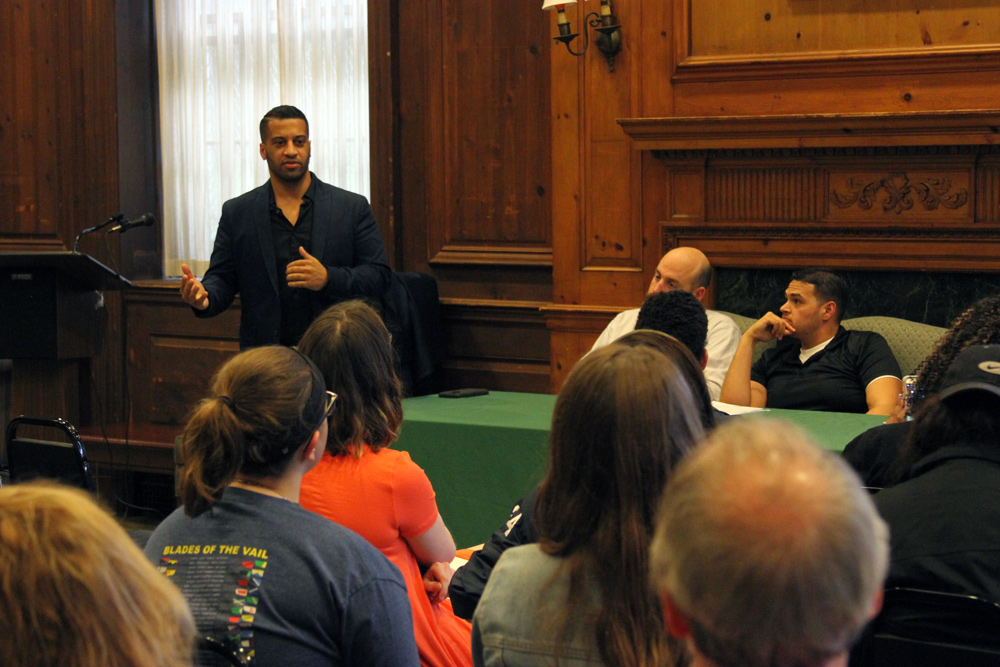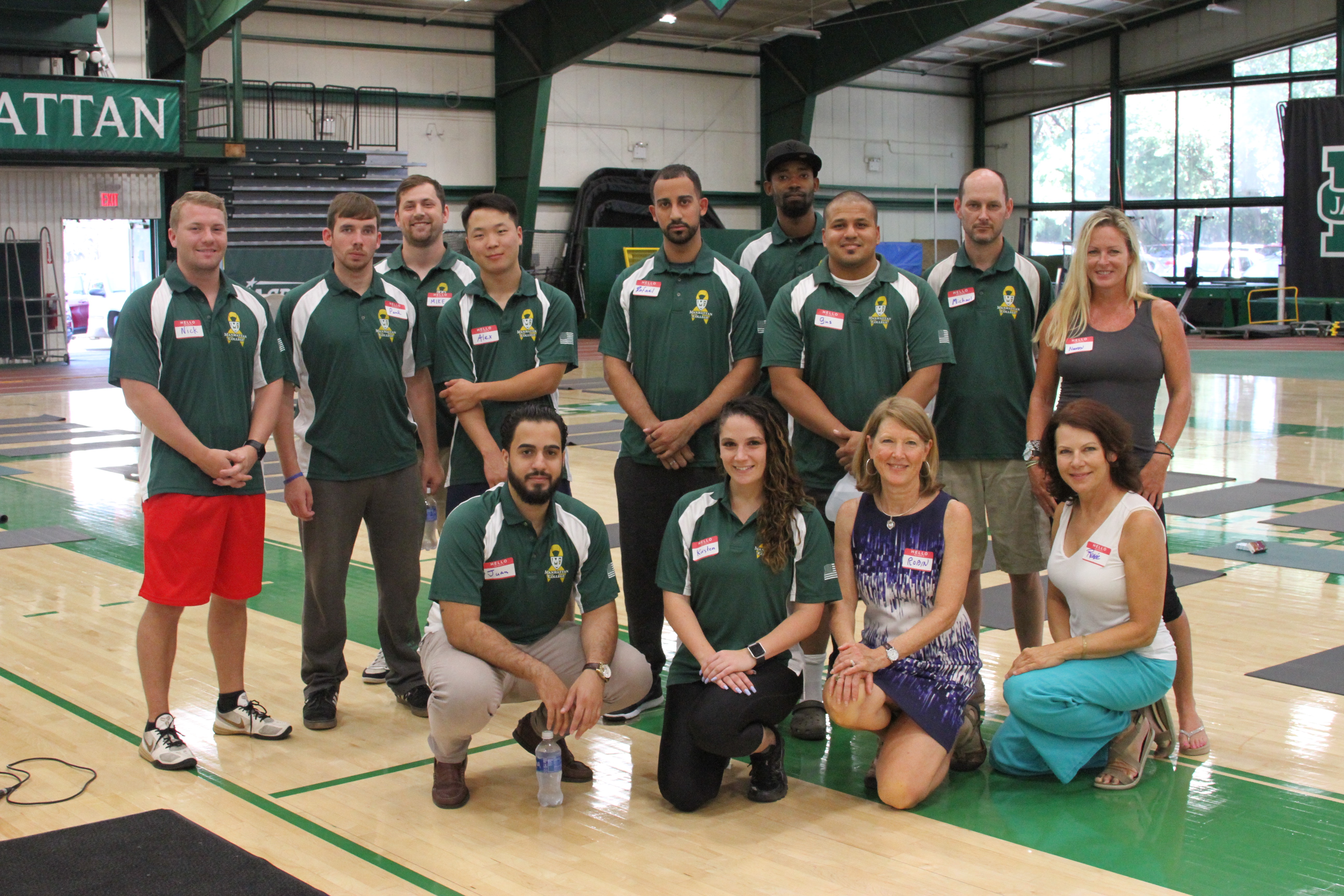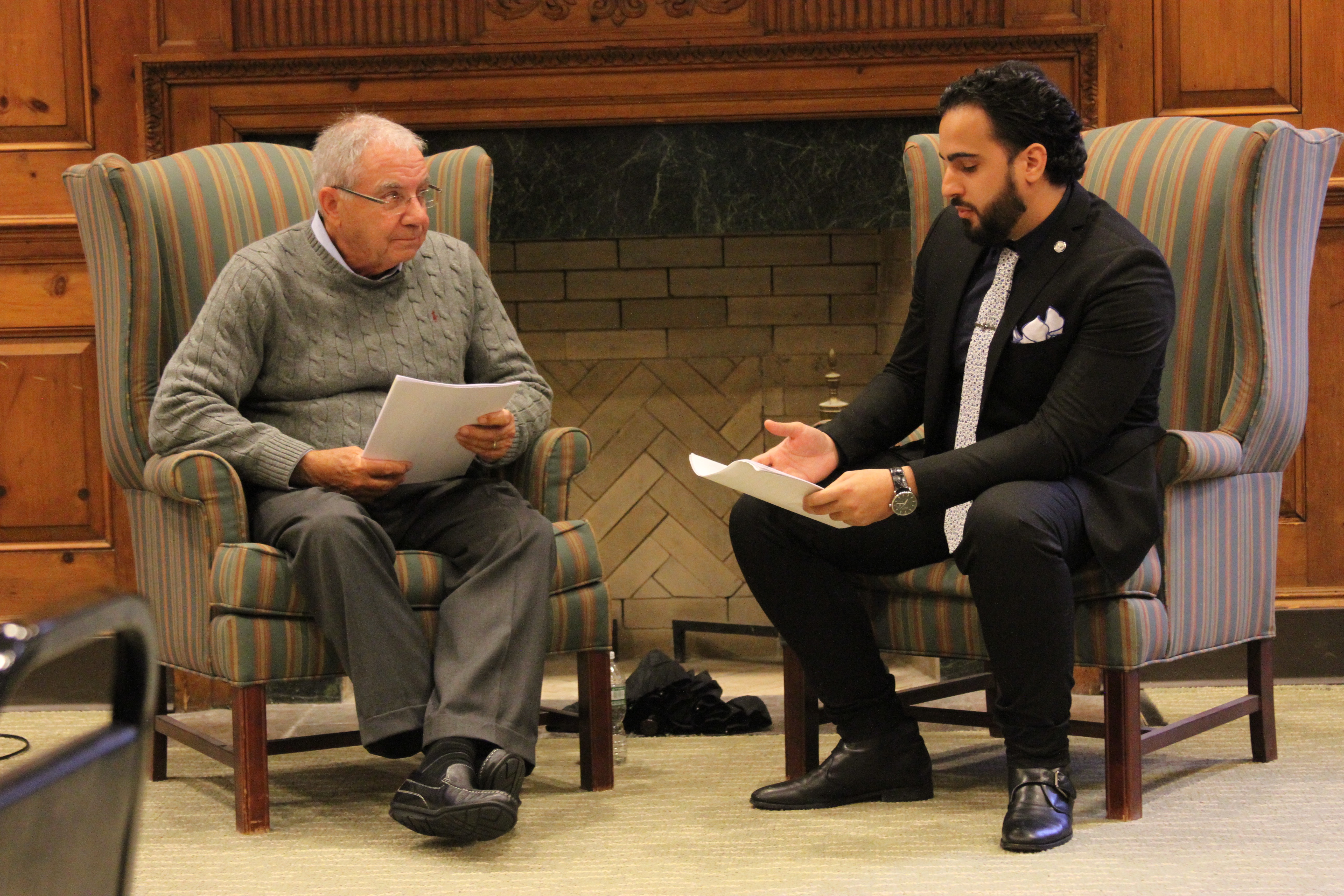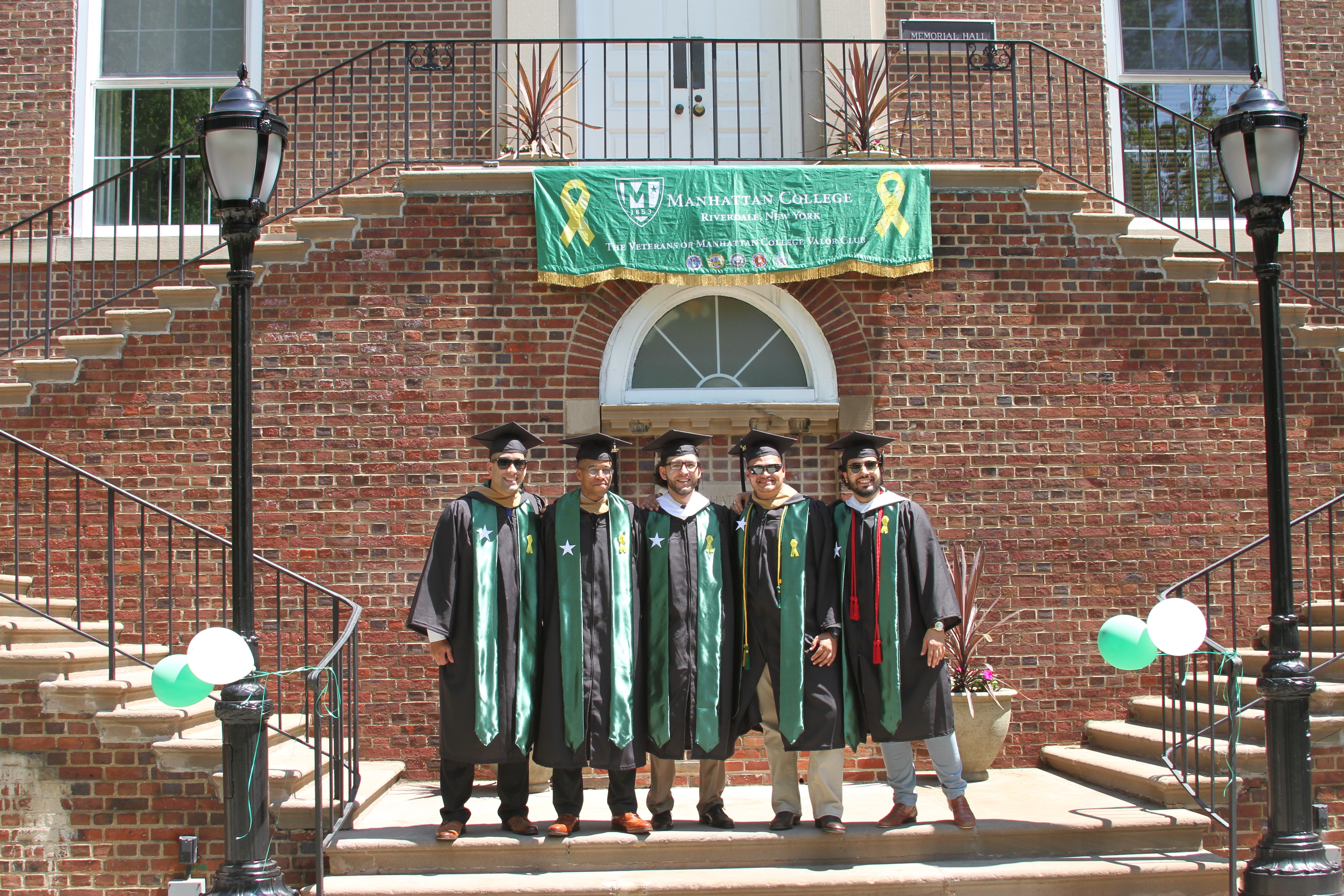Student Veterans Build Community Centered Around Success at Manhattan College
Over the past three years, a homegrown Veterans Success Program has provided a way for student veterans to acclimate to college life and find their place among peers.
It’s a Thursday night in Riverdale, and a lively crowd has gathered at a long table in the back room of An Beal Bocht for a couple end-of-week pints. The men and women all hail from different backgrounds and have varying opinions on the topics they’re about to discuss, but share two very important qualities: they’re all current Manhattan College students, and they’ve all served in the U.S. Armed Forces.
These weekly open table forums led by David Bollert, Ph.D., visiting assistant professor of philosophy, have become a staple among the student veteran population at the College, which has grown by more than 50% since fall 2014.
“It isn’t mandatory, but we’re there if you want to talk about issues pertaining to school, family, current events, even Mets and Yankees prospects — just to help generate a sense of community, a sense of camaraderie,” Bollert says.
Since the forums started, the discussions have ranged in topic from sports and music to bioethics, drones and politics. And they’re open to everyone.
“Any time we've had more than one professor or an administrator attend, it means a lot to the veterans,” Bollert adds. “It's a palpable sign that more and more people are taking note of them and their important place in our community. You show up, that shows that you care.”
Sharing Their Stories
Over the past three years, Manhattan’s faculty and administration have worked tirelessly with student veterans to build a unique and supportive community on campus as they readjust to civilian life and take on the new challenges of college.
“We spent our ‘college years’ away from home, all over the world, doing a life or death job,” says Kirsten Battocchio ’18, a Marine Corps veteran and current president of Manhattan’s Student Veterans Organization (SVO). “I think the firsthand and unique stories we possess are our greatest asset to campus.”
 In an effort to share these stories outside of their own circles and collaborate with academic departments, SVO co-sponsored two well-attended panels during the spring semester. The first, War and Peace: A Veterans Perspective, coincided with the College’s celebration of Peace Week and took on the oft-misunderstood topic of how the U.S. military propagates peace during wartime. A month later, an all-female Women Who Served panel opened up a discussion on the stereotypes that women in the military face.
In an effort to share these stories outside of their own circles and collaborate with academic departments, SVO co-sponsored two well-attended panels during the spring semester. The first, War and Peace: A Veterans Perspective, coincided with the College’s celebration of Peace Week and took on the oft-misunderstood topic of how the U.S. military propagates peace during wartime. A month later, an all-female Women Who Served panel opened up a discussion on the stereotypes that women in the military face.
“I think oftentimes we don't realize how many of our classmates are veterans,” says Alannah Boyle ’18, a peace studies and philosophy major. “The panels helped open my eyes to the fact that so many of my peers have had these incredible lived experiences in the military, that they are bringing into the classroom when they are analyzing the same works that I'm analyzing with my own completely different set of experiences.”
“What the veterans have to share with their peers is invaluable,” adds Stephen Kaplan, Ph.D., professor of religious studies and director of the Veteran Success Program. “This year, they are seriously and actively organizing academic panels that enrich the whole community.”
Veterans Success
 Kaplan admits that building community wasn’t at the top of his agenda two years ago. In March 2015, he took his first group of veteran students to the Bahamas as part of an adapted section of The Nature and Experience of Religion course. Partnering with Warriors at Ease, a nonprofit that teaches yoga, meditation and stress reduction techniques to veterans, Kaplan says he thought that first trip might be a one-off success.
Kaplan admits that building community wasn’t at the top of his agenda two years ago. In March 2015, he took his first group of veteran students to the Bahamas as part of an adapted section of The Nature and Experience of Religion course. Partnering with Warriors at Ease, a nonprofit that teaches yoga, meditation and stress reduction techniques to veterans, Kaplan says he thought that first trip might be a one-off success.
But the successes continued. Since then, nearly 50 student veterans have taken part in Manhattan’s “Veterans at Ease” program in the Bahamas, including a record 24 students this past academic year. The College’s retention rate for veteran participants is at 92%.
And community, it turns out, was a natural side effect.
After returning home from the Bahamas, student veterans and their supporters began to organize social events and fundraisers. In the two years since, the SVO has become a fixture in the New York City Veterans Day Parade, and they’ve added panel discussions, community service events, a vet-to-vet mentoring program and a guest speaker series to their annual repertoire — the Veterans Success Program was born.
“They come out of a highly structured lifestyle in the military, and come to college where they’re taking 15 credits a semester — that’s a lot of free time,” Kaplan says. “Before the Veterans Success Program, there wasn’t a way for them to identify with each other.”
Paving the Way
 In April, members of the SVO gathered in the Alumni Room of O’Malley Library to host their 2017 keynote speaker — Air Force veteran, Manhattan College trustee and alumnus Neil Higgins ’62, Ph.D., P.E., who is the retired CEO and co-chairman of Applied Research Associates, Inc.
In April, members of the SVO gathered in the Alumni Room of O’Malley Library to host their 2017 keynote speaker — Air Force veteran, Manhattan College trustee and alumnus Neil Higgins ’62, Ph.D., P.E., who is the retired CEO and co-chairman of Applied Research Associates, Inc.
“You have a lot of experience, and some of it is very extreme experience,” Higgins said, commending the veterans for their service. “That, in many ways, benefits you, and in other ways it may hinder you. But I know the College will do everything it can, whatever it takes to help you succeed in your endeavors.”
“The point of this speaker series is to show that veterans are successful,” added Juan Rosario ’17, an Air Force veteran, past president of the SVO and host of the Higgins lecture. “We want Manhattan College to be recognized for its successful alumni, and we hope to keep this tradition going.”
 In May, another wave of student veterans became alumni themselves, taking on new challenges and continuing to pave the way for their comrades. Kaplan has submitted a proposal for an on-campus Veterans Resource Center, in the hopes that there will be a designated space and budget for the Veterans Success Program by September 2017.
In May, another wave of student veterans became alumni themselves, taking on new challenges and continuing to pave the way for their comrades. Kaplan has submitted a proposal for an on-campus Veterans Resource Center, in the hopes that there will be a designated space and budget for the Veterans Success Program by September 2017.
“In a thousand years I wouldn’t have guessed that we’d be where we are now,” says Kaplan, smiling. “It’s all come from their ability to organize, succeed and help each other become a part of the Manhattan College community.”